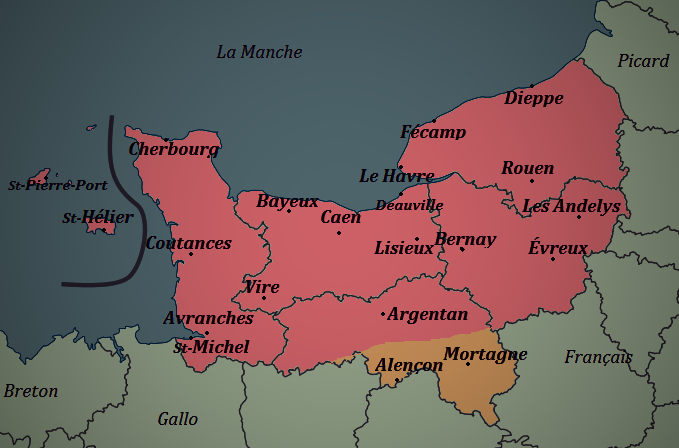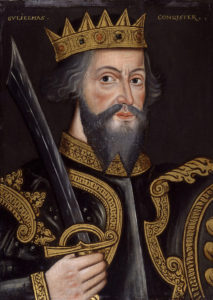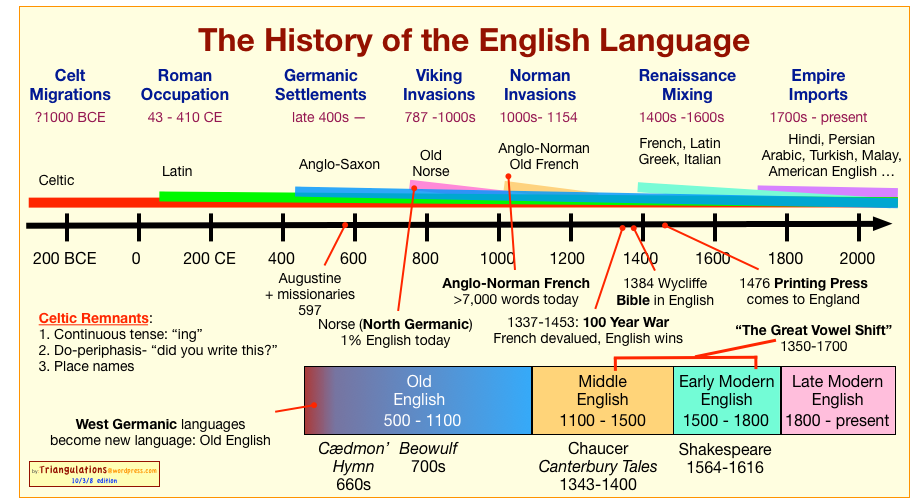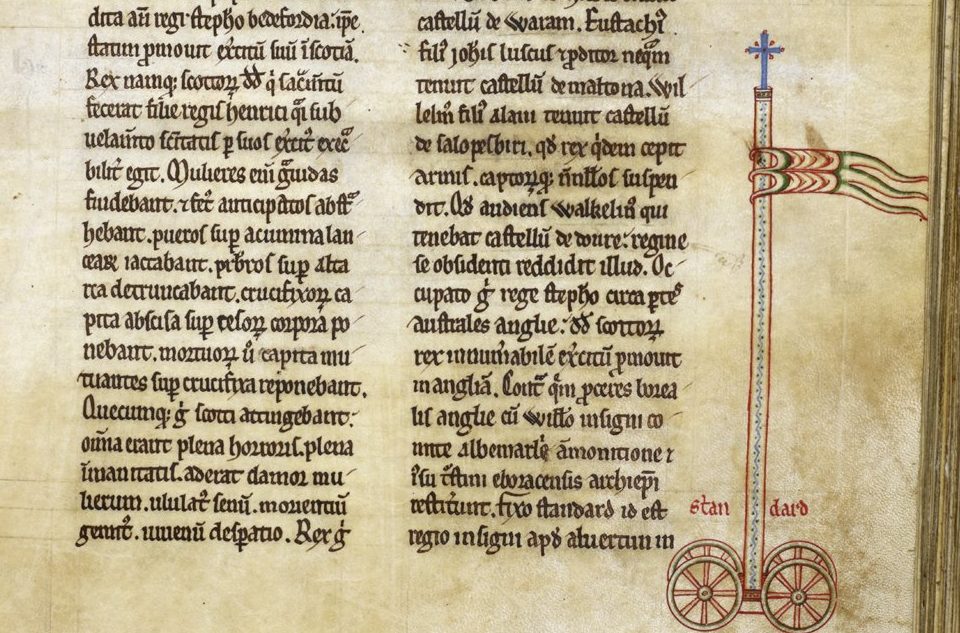
Language was an integral part of any ruling kingdom over England during the medieval period. Keeping ruling a kingdom aside, for any day to day activity in any region, it is required that people can communicate with each other. Thus, language is the root of anything which is required to live and then rule a kingdom.
Before the Normans came into rule, the Anglo Saxons mainly followed the old English language. Likewise, when the Romans used to rule over England even before the Anglo Saxons, they used to follow their own choice of language. Similarly, when the Normans came to power, they chose which language to follow for their own good. Thus, today let us study facts on what words did the Normans bring to England?
Replacement of the Old English language
Contents
After the Normans invaded England and started ruling England, they eliminated or wiped out almost every bit of old English which was followed by the Anglo Saxons in England. This also resulted in the catholic churches losing the control of English in England.
William I the conqueror also started a systematic way to dispossess all the landowners of their land who were of the English background. As per a study by the historians, it is seen that by the end of the year 1086, approximately only 5% of the entire land belonging to England was given to people who were of the English background.

But this was not the end to it. With further time coming up and with further decades, this tiny number of 5% was even dispossessed and diminishing. Thus, the Normans completely disposed off the English native after coming to rule over England.
Natives of the English origin who used to speak or follow the English language were slowly and completely removed from the ecclesiastical offices and also the government offices.
By the end of the year 1075, the situation was such that the people of English native following the English language were not appointed with the role of sheriffs inside such ecclesiastical offices and government offices. The same effect then started coming on the churches. All senior members of the offices of the churches who were of the English native and followed the English language were removed.
In some cases, they were kept to their lifetime but however, as those died, they used to be replaced immediately with foreigners. By the end of the year 1096, there were no bishopric which was held by the people of the English native following the English language. Even the abbots of English started becoming uncommon, which specially happened in the monasteries.
Emigration of the Old English language and people of English native

Due to the harsh rules and regulations implied on the English natives by the Normans, there were many Anglo Saxons and also many groups of Anglo Saxons nobles who decided to flee from the country and took shelter in places like Scandinavia, Ireland and Scotland.
In 1070, history witnessed one of the largest exoduses which took place when around 235 ships were used till Byzantine Empire for the group of Anglo Saxons nobles to flee from England. These nobles used to follow the old English language. However, this effect made the empire of Byzantine famous.
There was a high demand in need of the mercenaries in byzantine empire and thus this place became a very popular destination of flee for the nobles of the English native and following the English language.
Language bought forward by the Normans during their rule over England

After the Normans came to power over England, we have seen that they used to replace and emigrate people of English native and English language. Thus, obviously Normans bought their own language of communication. This the period in which such instances took place was the Anglo Normans period.
Anglo Normans was of the dialect of old French which was introduced and influenced from old Norse. Thus, they displaced the entire existence of old English. Slowly and steadily the words belonging to the Anglo Normans started being included in the language.
Another chief point of highlight was the usage of Anglo Normans name for children instead of the names which were present during the time of the Anglo Saxons. The speed with which male names changed, the change of female names was a bit slower. Names for male like Robert, William and Richard soon started becoming very common names.
Facts placed by the historians after study doesn’t quite tell us how much the Normans learned English which was followed by the Anglo Saxons as that was the continuous language which was present when the Normans invaded England. Similarly, the studies of the historians also doesn’t give us a clear idea on how much the lower class of people learned the Norman French language as it was a new language suddenly all together for them.
Norman French Language
Norman French is the 11th century Indo-European language of France and England.
During this era, many Norman French words entered the language. In general, the Normans were the nobility, while the native English were their servants. The names of domestic animals and their meats show this relationship. The animal name is English (“cow”, “sheep”, “pig”) while the names of the meats derived from these animals is French (“beef”, “mutton”, “pork”).
Many words have been borrowed from Norman French. These can be grouped into several types:
Legal terms (“adultery”, “slander”), military words (“surrender”, “occupy”), names of meats (“bacon”, “venison”) and words from the royal court (“chivalry”, “majesty”). The non-metric unit of volume (the “gallon”) is Norman French. There are many other words.
The Normans introduced the QU spelling for words containing KW (“question”).
New words introduced by the Normans
| Word | Meaning |
| accuse | |
| adultery | |
| archer | |
| assault | |
| asset | enough |
| bacon | |
| bail | to take charge |
| bailiff | carrier |
| beef | |
| butcher | seller of goat flesh |
| button | |
| chivalry | horseman |
| comfort | strengthen |
| court | retenue |
| courtesy | |
| cricket | |
| crime | judgement |
| curfew | cover fire |
| custard | |
| defeat | |
| dungeon | |
| duty | |
| eagle | |
| elope | run away |
| embezzle | ravage |
| enemy | non friend |
| error | |
| evidence | |
| exchequer | |
| fashion | make |
| felony | |
| fraud | |
| gallon | jug |
| goblin | |
| gourd | |
| grammar | art of letters |
| grease | fat |
| grief | |
| grocer | |
| gutter | drop |
| haddock | |
| havoc | |
| hogmanay | |
| honour | |
| injury | wrong |
| jettison | throw overboard |
| joy | |
| judge | right speaking |
| jury | swear |
| justice | |
| larceny | |
| launch | hurl |
| lavender | |
| lease | leave |
| leisure | allowed |
| lever | to raise |
| liable | may be bound |
| libel | little book |
| liberty | free |
| liquorice | sweet root |
| mackerel | |
| majesty | |
| mangle | |
| manor | remain |
| marriage | |
| matrimony | |
| mayhem | |
| mutton | |
| noble | |
| noun | name |
| nurse | nourish |
| occupy | seize |
| odour | smell |
| parliament | speaking |
| pedigree | crane’s foot |
| penthouse | |
| perjury | |
| pinch | |
| platter | big plate |
| pleasure | |
| small bag | |
| pork | |
| prison | lay hold of |
| profound | deep |
| purloin | put away |
| purveyor | |
| push | |
| quarter | |
| question | |
| quiet | |
| quiver | |
| rape | take by force |
| reason | |
| rebuke | |
| rebut | |
| recover | |
| remedy | to heal |
| renown | to make famous |
| rent | |
| repeal | |
| reprieve | send back |
| reprisal | |
| retail | piece cut off |
| reward | |
| river | |
| robe | |
| royal | |
| rummage | |
| salary | salt |
| salmon | |
| scavenger | tax collector |
| scullery | maker of dishes |
| search | |
| sermon | |
| sewer | |
| share | |
| shop | cobbler’s stall |
| sir | |
| slander | |
| soil | Called ‘dirt’ in the USA. |
| sovereign | |
| spawn | |
| spy | |
| squirrel | little shadow tail |
| stubble | grain stalks |
| subsidy | support |
| suitor | |
| surname | |
| surplus | |
| surrender | |
| survey | |
| survive | over live |
| syllable | |
| tally | mark on a stick |
| tax | to charge |
| toil | stir |
| treason | |
| treaty | |
| uncle | |
| usher | door keeper |
| valley | |
| veal | |
| veil | |
| venison | to hunt |
| vicar | assistant |
| vice | |
| view | |
| virgin | |
| vulture | |
| wafer | |
| waive | |
| warden | |
| wicket | gate |
| wreck |
But for daily communication, there were people who were bilingual, that is, could understand both the English language as well as the Norman French language which helped those people who didn’t understand either any one of the two languages.
Slowly with due course of time, Norman French started spreading more widely among people as it became the official language to be used. This is how old English slowly diminished and Norman French took up the place of English language which was during the Anglo Saxons time.
However, among all of these, the first ruler among the Norman kings, that is, William I the conqueror never showed any interest in developing the knowledge of knowing English for himself.
It is said that the languages Anglo Norman and Anglo French were languages which were eclipsed by the modern English language. But the way Anglo Norman language and Anglo-French language was used, it made a permanent impact on the influence of the vocabulary of English language. This resulted in the loss of many original words of the German language or was used as synonyms to the original words in the Anglo-French language.
